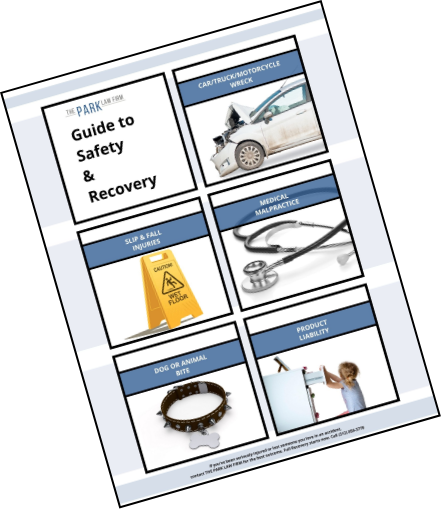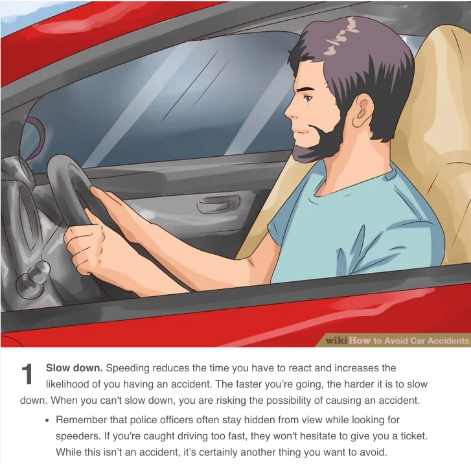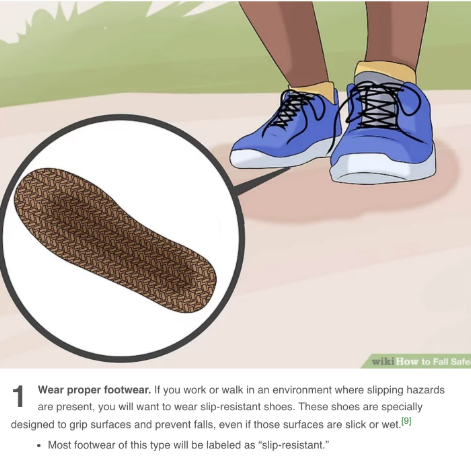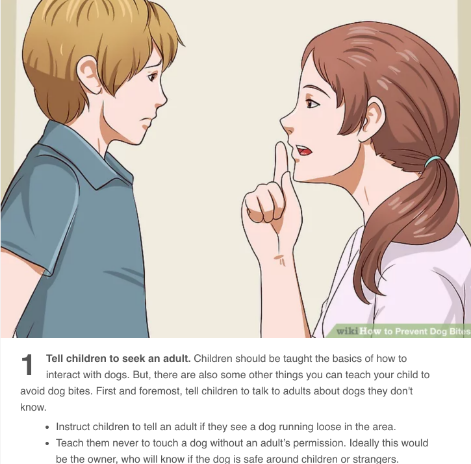FAQ + FYI

SEAN PARK LAW FIRM GUIDE TO SAFETY & RECOVERY
Better Outcomes for You & Everyone You Love
Our commitment to each client is to partner with them to address every pain and concern they’re experiencing and put them on the path toward Full Recovery – physically, legally, financially, and emotionally. With this Guide to Safety & Recovery, we aspire to be helpful not only to each of our clients, but also to everyone they love. So even though the number of cases we can serve at any time is limited, the number of people we can help keep safe is not.
Download it, print it, share it with the people you care about most, and keep a copy in the glove compartment of your car, in your home, at work, all the places where accidents are most likely to happen.

Questions and Answers About Your Personal Injury Case
At Sean Park Law Firm, we’ve been answering questions about lawsuits and cases for more than 20 years. The questions below are the same questions most personal injury plaintiffs ask us.
Frequently Asked Questions
PERSONAL INJURY QUIZ
If you’ve been injured in an accident and need to know if a skilled personal injury attorney thinks you have a good case, we can tell you in less than 5 minutes. All you have to do is answer a maximum of 6 multiple choice questions.
Let’s get started.
What does that mean?
The language of the law isn’t always easy to interpret. This might help.
LAWSUIT TERMS AND DEFINITIONS
Here are the most essential words you can expect to hear when you file a personal injury lawsuit.
Plaintiff (or Claimant)
The plaintiff is the person or group of people filing the lawsuit. If you are stopped at a red light and are struck from behind which injures your neck, you would be the plaintiff.
Defendant (or Adverse Party)
The defendant is the person or group of people which the plaintiff believes are responsible for the plaintiff’s injury. In the scenario above, the person driving the vehicle that struck the plaintiff’s car would be the defendant.
Insurance Claim Adjuster
This is an investigator who evaluates the case either for the insurance company of the Defendant who injured you, or for your own insurance company. Regardless, they do not represent your interests – they seek to protect the insurance company’s interests.
Counsel & Opposing Counsel
Counsel refers to an attorney on either side. Opposing counsel refers to the attorney on the other side of the complaint.
Complaint
The complaint is the formal written statement of what the plaintiff accuses the defendant of having done.
Damages
Damages is what the plaintiff seeks to compensate for the losses, pain, and suffering attributed to the accident.
Statute of Limitations
The finite period of time during which the plaintiff can file suit claiming damages.
Though no two cases are alike,
here is an idea of what to expect as your case proceeds through the legal system.
8 STEPS IN A PERSONAL INJURY CASE
Your role in a lawsuit
As the client or plaintiff in a personal injury lawsuit, there are several things you can do to help improve the outcome of your case.
Do not admit fault
for the accident or your injury or discuss or apologize for what happened with anyone. Leave it to the professionals – the police or judge or jury in your case to decide who was to blame.
Follow through
with the course of treatment prescribed by your doctor. Discontinuing treatment can affect the outcome of your case.
Document
your experience after the accident with photos, journal entries, or videos – what is now difficult or impossible for you to do, how is your recovery progressing, how is your life different at work and at home, and in your relationships.
Share
your photos, journal entries, or video with your attorney but do not post them online or on social media. It can only hurt your case.
Gather
police reports, insurance documents, medical bills, photos or videos of the accident scene and your injury, etc. and share with your attorney.
Though we can’t control what happens on the road,
we can control how we respond if and when we get into an accident. Follow these steps for your best shot at a great outcome.
For your safety, download our 10 THINGS YOU SHOULD AND SHOULD NOT DO guide below, Print it, and keep a copy in your home. Make additional copies for people you love.
10 Things You Should And Should Not Do After A Car/Truck/Motorcycle Accident
1
IF POSSIBLE, DRIVE YOUR CAR OUT OF TRAFFIC AND DETERMINE IF THERE ARE INJURIES Put your hazards or blinking lights on and indicate to the other driver that you’re pulling off the road so you won’t cause another accident to occur. Once your car is safely on the shoulder of the road, see if anyone in your car is injured.
2
CALL 911 Even if no one appears to have been hurt, and whether or not you think you were at fault, call 911 and tell them where you are, how many vehicles were involved, and if there are any injuries.
3
STAY WITH YOUR CAR Unless an ambulance arrives to take you directly to the hospital, stay at the scene of the accident until the police arrive.
4
DO NOT POST PHOTOS, VIDEOS, OR TEXT ON SOCIAL MEDIA Many cases have been profoundly affected by the photos, texts, and videos that drivers have posted after their accident. Don’t do it.
5
GATHER INFORMATION If you’re not injured, see if the driver/passengers in the other car are injured. If not, take a photo of the driver’s license and insurance card or write down the name of the insurance company and policy number. Write down names of passengers. Take photos of the damage, make, model, and license plate number of all cars involved; and of weather and traffic conditions that may have affected the accident. Get witnesses’ contact information.
6
ALLOW THE POLICE TO FULLY INVESTIGATE AND MAKE SURE THEY WRITE A REPORT Don’t discuss or apologize for what happened with anyone. The police often investigate as soon as they arrive. Tell them what you saw and experienced and let them draw conclusions. You will be given a copy of the police report before they leave the scene of the accident. If the other driver was reluctant to show an ID or insurance card, the police will get that information from them.
7
SEEK IMMEDIATE MEDICAL TREATMENT Insurance companies love to minimize your injuries by saying you weren’t hurt badly enough to immediately seek medical evaluation and treatment. Listen to your body and make sure to seek follow up care for any persistent aches, pains, and limitations.
8
CONTACT YOUR OWN INSURANCE COMPANY Similar to your conversation with the police, call your insurance company to report the wreck and initiate a claim. Stick to just providing the factual details of what happened. If an insurance adjuster calls you to ask for a recorded statement, contact an attorney immediately before you agree to give a recorded statement to any insurance company.
9
DO NOT SPEAK TO THE OTHER DRIVER’S INSURANCE COMPANY OR SIGN ANY DOCUMENTS You are not required to speak with the other driver’s insurance company. Don’t do it – it can only work against you. And certainly do not sign any sort of agreement or promise of payment for the damage to your car or any injuries you’ve sustained.
10
CONTACT A PERSONAL INJURY ATTORNEY QUICKLY Leave it to the professionals to straighten out the legal aspect of the car accident. Remember: you pay nothing unless you win your case. The sooner you hire your own attorney and share everything you remember about the accident with total honesty, the CLICK HERE TO PRINT. better it is for your case and your outcome. Don’t try to manage your case on your own.
Whether you slip or you trip,
what you do next could profoundly affect your outcome.
For your safety, download our 8 THINGS YOU SHOULD AND SHOULD NOT DO guide below, print it, and keep a copy in your home. Make additional copies for people you love.
8 Things You Should And Should Not Do After A Slip & Fall Injury
1
CALL 911 If you lost consciousness after your fall, or feel as if you’ve been injured, call 911 right away. Do not attempt to get up without assistance.
2
FILE OR DOCUMENT AN INCIDENT REPORT WITH THE FACILITY Ask the facility for a copy.
3
WAIT FOR MEDICAL HELP TO ARRIVE Only a medical professional can tell if you’ve been seriously injured.
4
WHILE YOU WAIT FOR THE POLICE OR EMT, TAKE PHOTOS TO DOCUMENT THE ACCIDENT Photograph the floor where you slipped, or the object you tripped on, as well as your injury.
5
DO NOT POST PHOTOS, VIDEOS, OR TEXT ON SOCIAL MEDIA Many cases have been negatively affected by the photos, texts, and videos that they have posted after their accidents. Don’t do it. And while you’re at it, don’t share photos or videos with anyone.
6
GATHER WITNESSES’ INFORMATION If anyone witnessed your accident, (ask them to stay while you wait for the emergency crew and) get their story as well as their contact information.
7
PRESERVE AND PROTECT THE CLOTHING AND SHOES YOU WERE WEARING Traces of whatever you slipped or tripped on may be left on your clothing, or perhaps blood from your injury. Either could be important evidence for your case, so put them in a protective covering for future use as possible evidence.
8
CONTACT A PERSONAL INJURY ATTORNEY QUICKLY Leave it to the professionals to manage the legal aspect of your accident. Don’t try to handle your case on your own. Remember: you pay nothing unless you win your case. The sooner you hire an attorney the better it is for your case and your outcome.
If You Suspect Medical Malpractice
People often don’t realize they have been a victim of medical negligence or malpractice until a lot of time has passed. While doctors and hospitals often help us heal, it can be devastating or fatal when they make mistakes.
Consider The Following Steps
- Ask another doctor or professional in the same field if your claim is valid. If they confirm that you or someone you love was mistreated, you know it is important to move forward.
- Before pursuing legal action, contact the medical professional you suspect of negligence or malpractice to get an understanding of what may have gone wrong or what missteps were taken during treatment.
- If both steps 1 and 2 confirm your suspicion of malpractice, contact and retain a medical malpractice attorney, someone skilled and experienced specifically in medical malpractice and negligence. If you choose Sean Park Law Firm, your consultation is free and you pay nothing until and unless we win your case.
- If you decide not to retain an attorney, contact the medical licensing board that governs the license held by the professional who injured you. There are separate boards for dentists, doctors, surgeons, etc. This may lead to the professional being issued a warning or other disciplinary actions.
- This is true for all legal claims, but it is critical to begin investigating a medical malpractice case early due to time/expense involved. Research how long you have to file your claim after your injury. There is a statute of limitations or time limit for medical malpractice claims.
Sean Park Law Firm offers uncommonly responsive and friendly service while delivering the justice our clients are entitled to. Our drive and determination in helping clients is unmatched. We carefully and skillfully navigate complex medical cases, ensuring the proper research, data, and experts are consulted to develop the best possible claim for each client.
Reach Out to Our Team For Insight!
If you suspect that you or a loved one were injured through medical negligence, it is important that you consult with a medical malpractice attorney as soon as possible. These types of cases require a great deal of time and expense to investigate and prepare. You risk missing a deadline and being barred from bringing any claims for your injuries if you wait too long to consult a medical malpractice attorney and much time has passed from the date of the injury. The consultation is free and you pay nothing until and unless you win your case.
If You’ve Been Injured By A Defective Product
For your safety, download our 7 THINGS YOU SHOULD AND SHOULD NOT DO guide below, print it, and keep a copy in your home. Make additional copies for people you love.
7 Things You Should And Should Not Do If You Have Been Injured By A Defective Product
1
SEE A DOCTOR Depending upon the severity of your injury or reaction to a medication or procedure, either see a doctor or go to a hospital immediately. Do not give a written or verbal statement regarding your injury; it could work against you.
2
TAKE PICTURES OF YOUR INJURIES Though medical records are essential to prove the severity of your injuries, photos of your injuries explain what words cannot – how serious the injuries were and how frightening. It’s up to you to visually document your injuries as well as your recovery. Ask a friend to help you.
3
TAKE PICTURES OF THE SCENE OF THE ACCIDENT Also take photos of the scene where the accident took place and the product that caused the injuries. If there is evidence to be documented where the accident took place, like blood, photograph that, too.
4
GATHER WITNESSES’ INFORMATION If anyone witnessed your accident, either get their contact information or ask them to stay while you wait for the emergency medical crew and police.
5
DO NOT POST PHOTOS, VIDEOS, OR TEXT ON SOCIAL MEDIA Many cases have been profoundly affected by the photos, texts, and videos that accident victims have posted after an accident. Don’t do it – it can be used against you.
6
DO NOT LAUNDER THE CLOTHES YOU WERE WEARING It’s possible that traces of chemicals from the defective product or blood from your injury are left on your clothing. Either could be important evidence for your case, so don’t wash them until your case is settled.
7
CONTACT A PERSONAL INJURY ATTORNEY QUICKLY Leave it to the professionals to manage the legal aspect of your accident. Don’t try to handle your case on your own. Remember: you pay nothing unless you win your case. The sooner you hire an attorney and share everything you remember about the accident, the better it is for your case.
If You’ve Been Bitten By An Animal
For your safety, download our 8 THINGS YOU SHOULD AND SHOULD NOT DO guide below, printit, and keep a copy in your home. Make additional copies for people you love.
8 Things You Should And Should Not Do After A Dog Bite Accident
1
SEE A DOCTOR If the bite wound is bleeding, wrap it with a clean towel and go to a medical clinic. If the wound is bleeding heavily, call 911 immediately. The police will also likely show up to investigate. If the police do not show up or if you go to a clinic, call the police and report the incident.
2
IDENTIFY OR CONTACT THE DOG’S OWNER The dog’s owner often lives nearby. You need to identify the owner or you will not be able to file a lawsuit to reimburse your medical expenses, or find out if the dog has had shots for rabies. If you cannot identify the dog’s owner, call animal control.
3
TAKE PICTURES OF YOUR INJURIES Though medical records are essential to prove the severity of your injuries, photos of your injuries explain what words cannot: how serious and frightening the injuries were. Visually document your injuries, your recovery, and evidence like blood or clothing. Ask a friend to help.
4
GATHER WITNESSES’ INFORMATION If anyone witnessed your accident, either get their contact information or ask them to stay while you wait for the emergency medical crew and police.
5
DO NOT POST PHOTOS, VIDEOS, OR TEXT ON SOCIAL MEDIA Many cases have been profoundly affected by the photos, texts, and videos that accident victims have posted after an accident. Don’t do it.
6
CONTACT YOUR OWN INSURANCE COMPANY Tell your insurance company what you experienced and set up a claim number. You do not have to provide a recorded statement however, and are not required to speak with an Insurance Adjuster.
7
DO NOT LAUNDER THE CLOTHES YOU WERE WEARING It’s possible that traces of information are left on your clothing, or perhaps blood from your injury. Either could be important evidence for your case, so don’t wash them until your case is settled.
8
CONTACT A PERSONAL INJURY ATTORNEY QUICKLY Leave it to the professionals to manage the legal aspect of your accident. Don’t try to handle your case on your own. Remember: you pay nothing unless you win your case. The sooner you hire an attorney the better it is for your case and your outcome.
How to Avoid a Car Accident / Slip & Fall Injury / Dog Bite Injury
HOW TO AVOID A CAR ACCIDENT

HOW TO AVOID A SLIP & FALL

HOW TO AVOID A DOG BITE

CREDIT TO WIKIHOW
